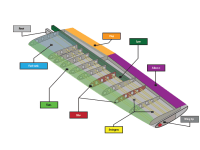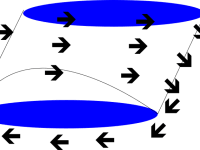Airfoil wings make lift by changing the direction and pressure of the air that crashes into them as they move through the sky. The spinning cylinder wing design, using the magnus effect and has many advantages over traditional airfoils but also some disadvantages. This design is a type of merger of these two known technologies in such a way as to make use of the advantages of both while eliminating the disadvantages. Some of the advantages are: More wing lift and less drag!
Instead of the solid, rigid, stationary design of a traditional airfoil, the Magfoil has an outer skin that rotates in a counterclockwise direction. In other words, as the plane flies through the air, the top of the wing moves from the front to the back of the wing and the bottom of the wing is moving from the back to the front. So even though it has the traditional airfoil shape, the wing itself is in motion. The design of the skin itself will also help keep the air attached to the wing and reduce separation.
Therefore, at much lower speeds and in shorter distances this creates a greater difference in air pressure between the top and the bottom of the wing. The addition of the outer rotating skin of the traditional wing design causes the air over the top of the wing to move faster while having greater resistance on the bottom side of the wing. What this means for the aircraft is that it can operate with smaller wings while having heavier loads and quicker takeoffs and dramatically saving on fuel. This means airlines could increase their profits while lowering prices to consumers.
On the more complex design, the skin would also have vortex generators that would pop up only on the upside of the rotation which would also help reduce separation, compared to traditional designs.
A airfoil wing and a spinning cylinder wing both create lift. The Magfoil will create much more lift more efficiently and will dramatically upgrade the airline industry.
Like this entry?
-
About the Entrant
- Name:Brandon Casutt
- Type of entry:individual
- Patent status:none








